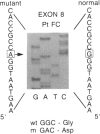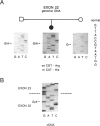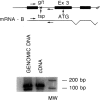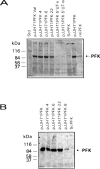Abstract
Human phosphofructokinase (PFK) is a tetrameric enzyme, encoded by muscle, liver, and platelet genes. Deficiency of muscle PFK (PFK-M), glycogenosis type VII (Tarui disease), is an autosomal recessive disorder characterized by an exertional myopathy and hemolytic syndrome. Several disease-causing mutations have been identified in the PFK-M gene in Japanese, Ashkenazi Jewish, and Italian patients. We describe the genetic defects in French Canadian and Swiss patients with the disease, and we use a genetically well-defined yeast system devoid of endogenous PFK for structure-function studies of the mutant PFKs. A G-to-A transition at codon 209-in exon 8 of the PFK-M gene, changing an encoded Gly to Asp, is responsible for the disease in a homozygous French Canadian patient. Gly-209-mutated protein is completely inactive in the yeast system. The Swiss patient is a genetic compound, carrying a G-to-A transition at codon 100 in exon 6 (Arg to Gln) and a G-to-A transition at codon 696 in exon 22 (Arg to His). The mutants expressed in yeast generate functional enzyme with modest changes in thermal stability. The advantages and limitations of the yeast system for expression of human mutant PFKs are discussed.
Full text
PDF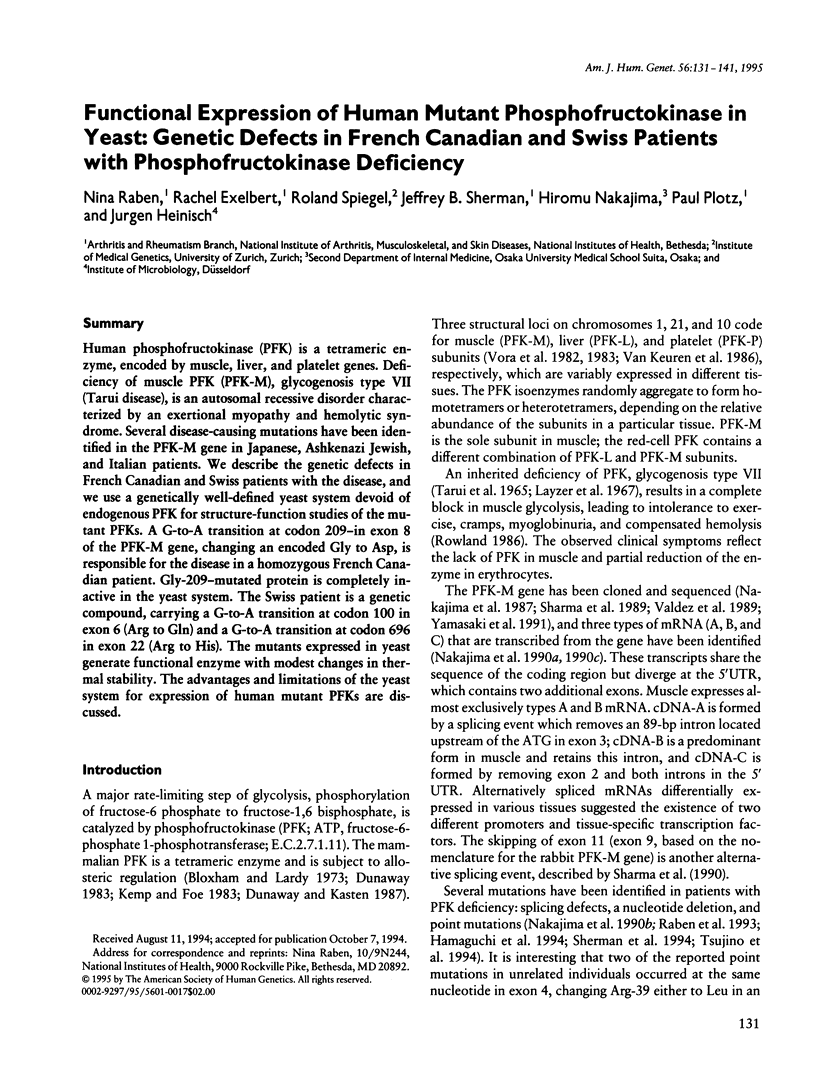
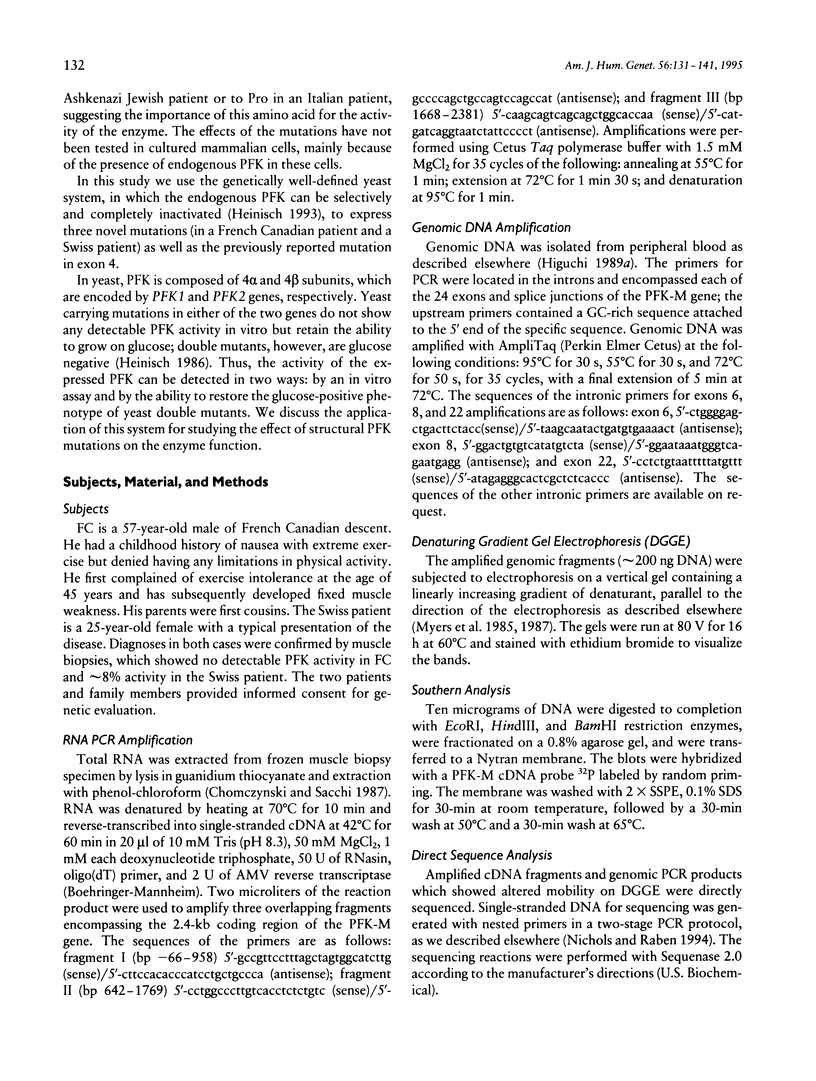
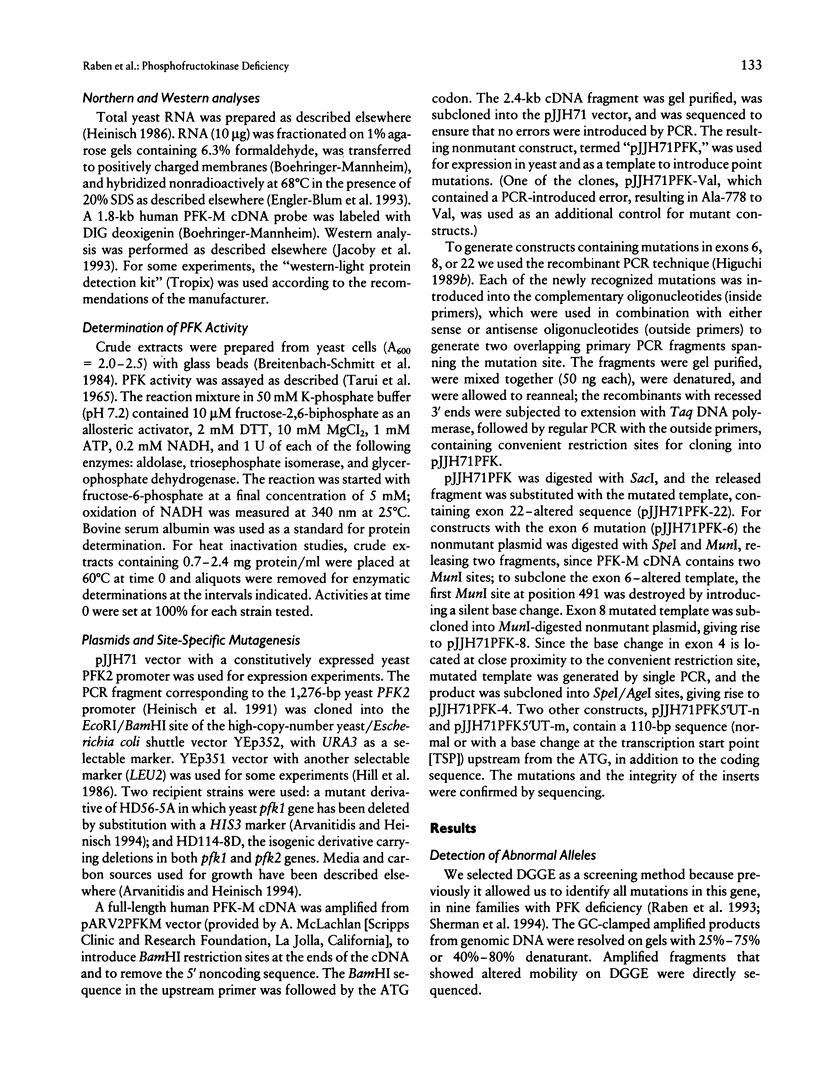
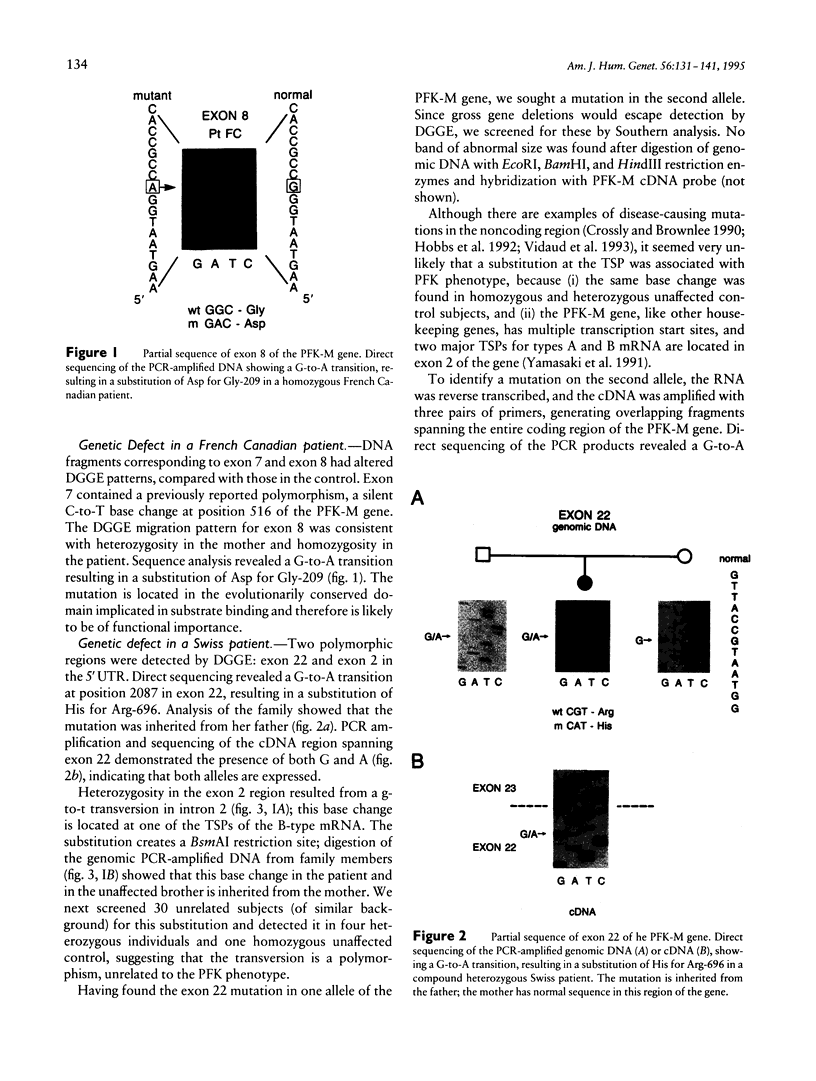
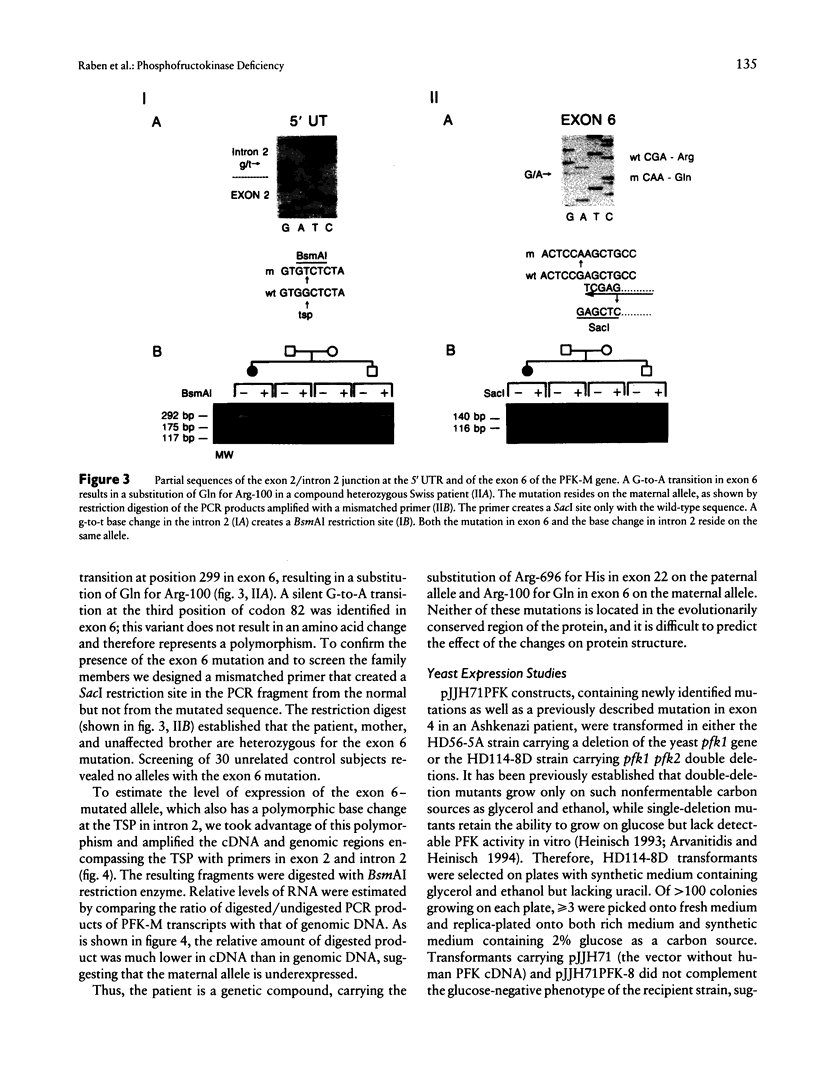
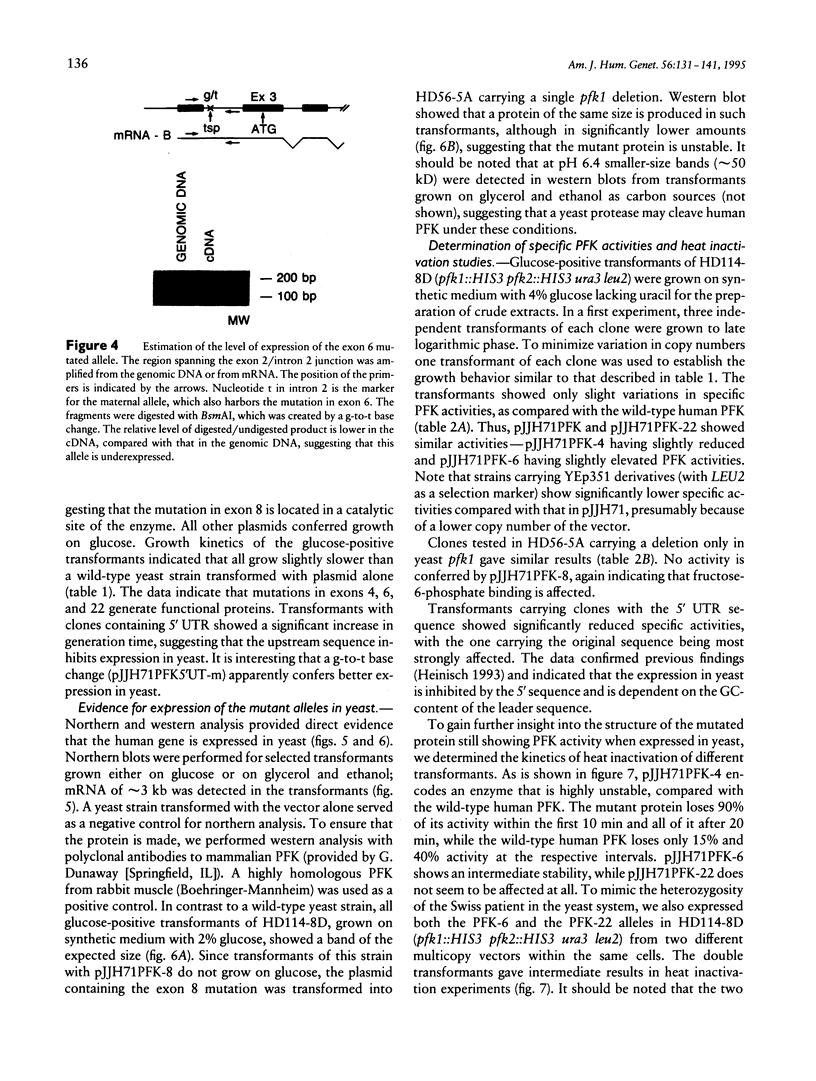
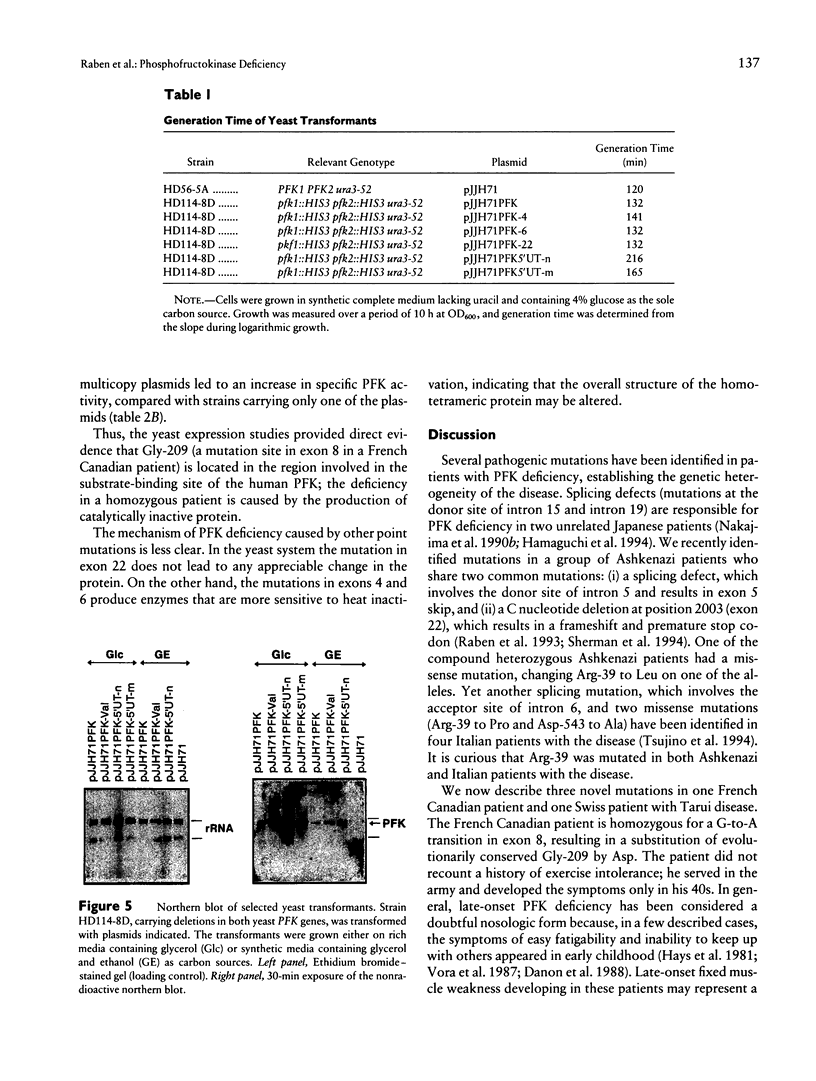
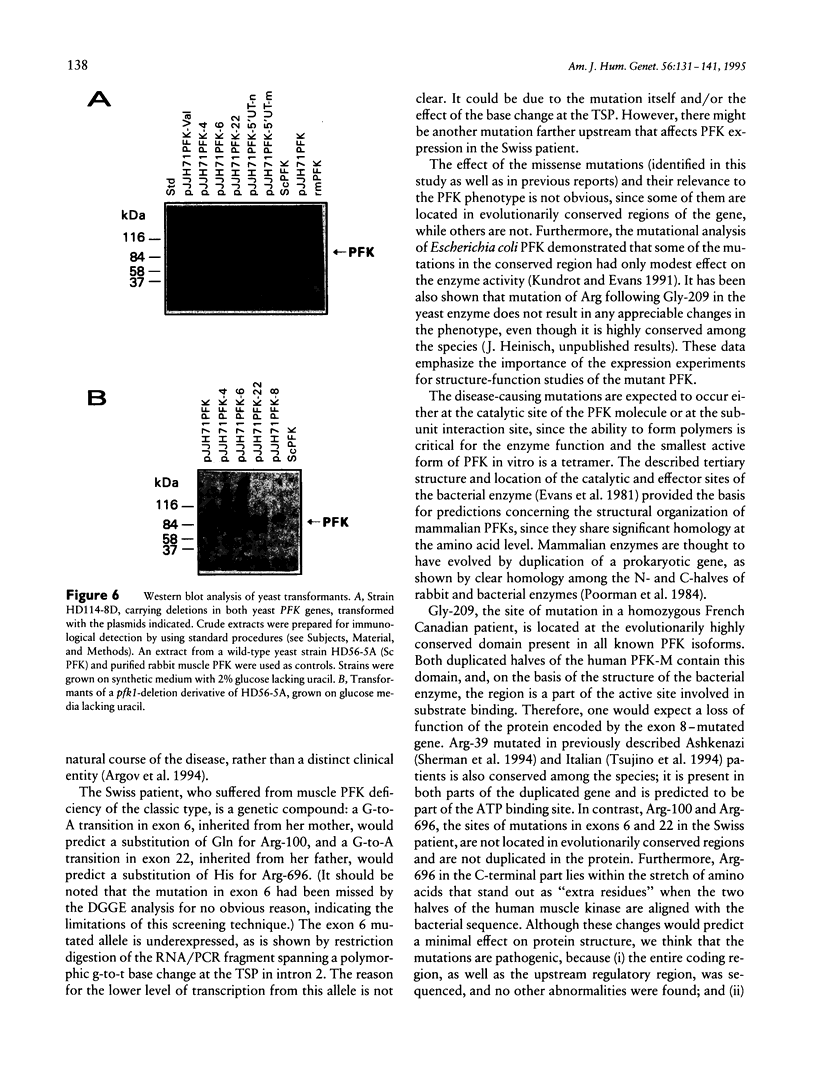
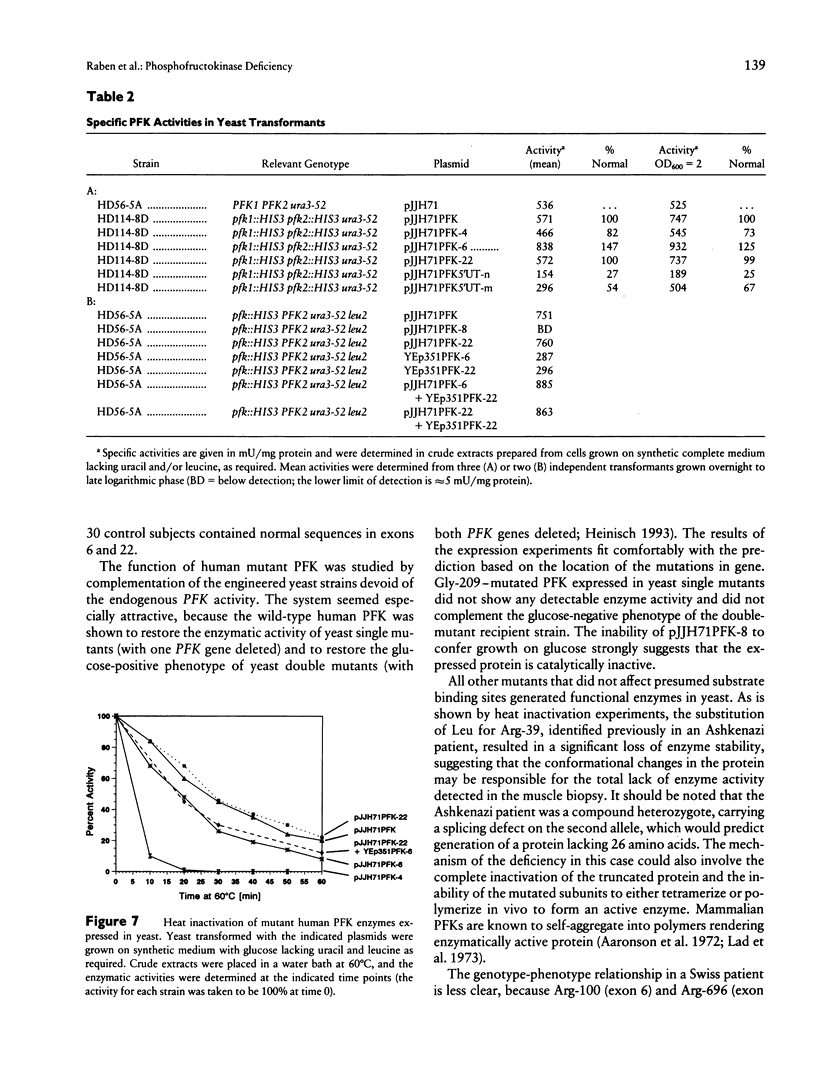
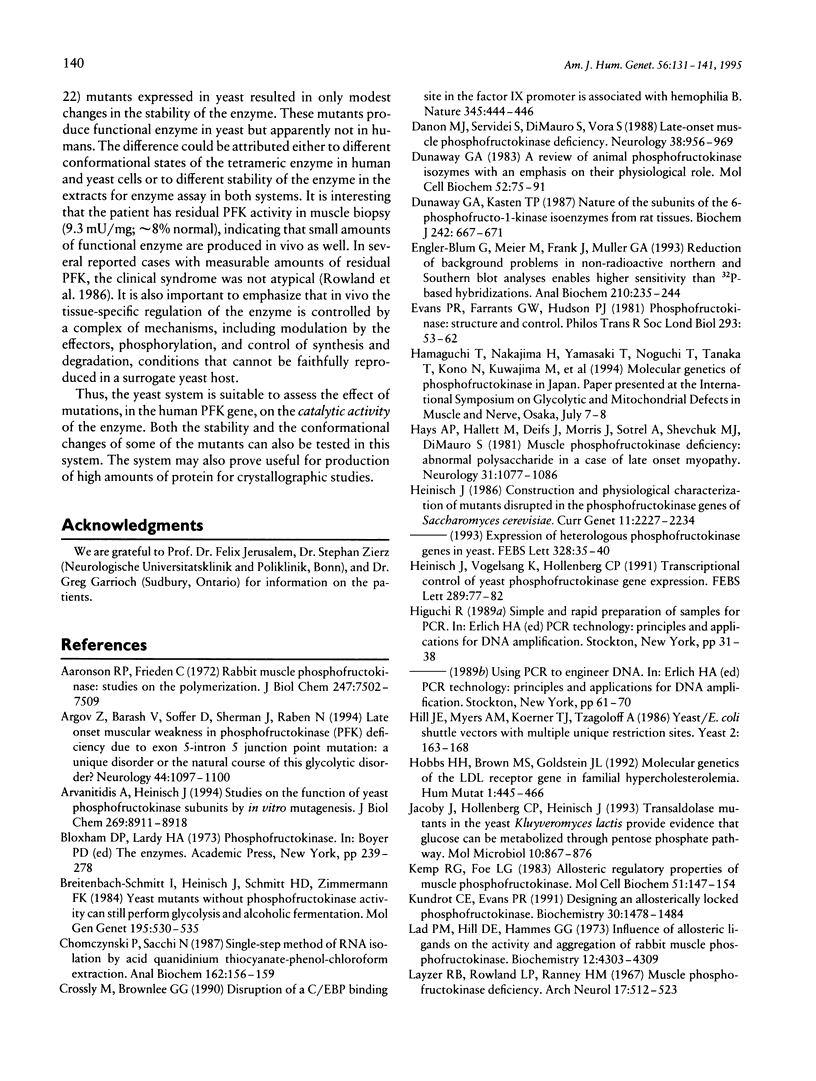
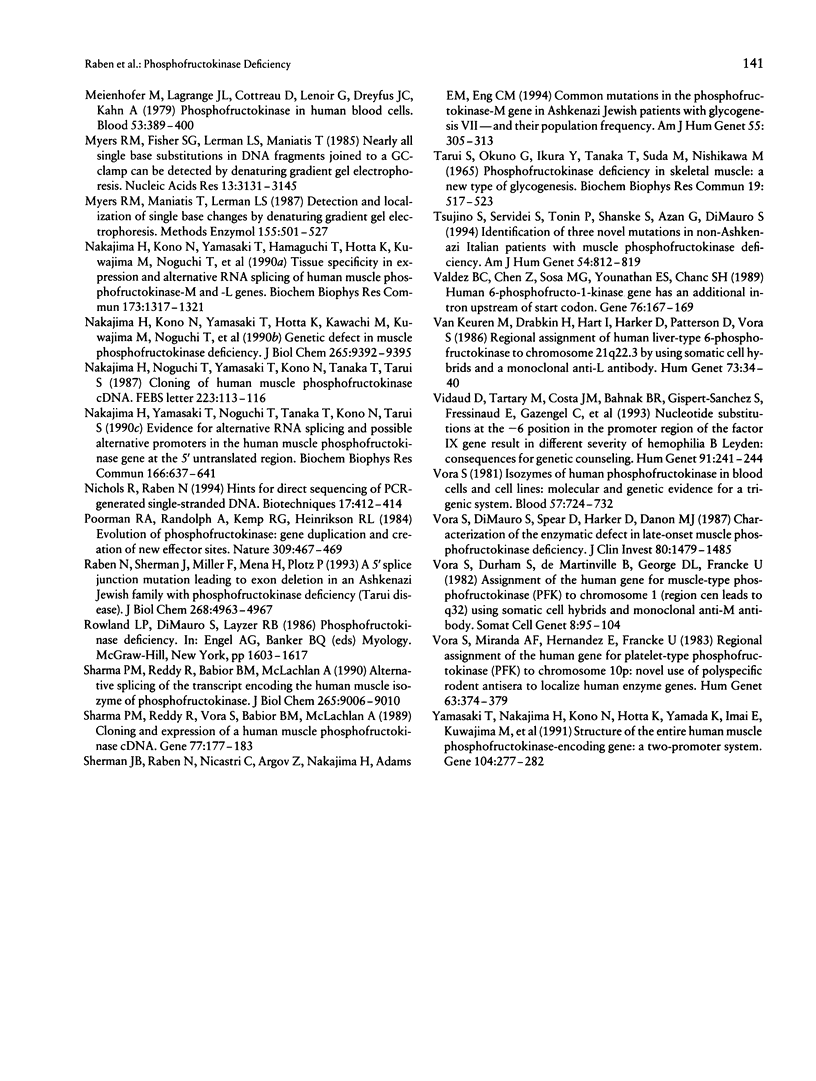
Images in this article
Selected References
These references are in PubMed. This may not be the complete list of references from this article.
- Aaronson R. P., Frieden C. Rabbit muscle phosphofructokinase: studies on the polymerization. The behavior of the enzyme at pH 8, pH 6, and intermediate pH values. J Biol Chem. 1972 Dec 10;247(23):7502–7509. [PubMed] [Google Scholar]
- Argov Z., Barash V., Soffer D., Sherman J., Raben N. Late-onset muscular weakness in phosphofructokinase deficiency due to exon 5/intron 5 junction point mutation: a unique disorder or the natural course of this glycolytic disorder? Neurology. 1994 Jun;44(6):1097–1100. doi: 10.1212/wnl.44.6.1097. [DOI] [PubMed] [Google Scholar]
- Arvanitidis A., Heinisch J. J. Studies on the function of yeast phosphofructokinase subunits by in vitro mutagenesis. J Biol Chem. 1994 Mar 25;269(12):8911–8918. [PubMed] [Google Scholar]
- Chomczynski P., Sacchi N. Single-step method of RNA isolation by acid guanidinium thiocyanate-phenol-chloroform extraction. Anal Biochem. 1987 Apr;162(1):156–159. doi: 10.1006/abio.1987.9999. [DOI] [PubMed] [Google Scholar]
- Crossley M., Brownlee G. G. Disruption of a C/EBP binding site in the factor IX promoter is associated with haemophilia B. Nature. 1990 May 31;345(6274):444–446. doi: 10.1038/345444a0. [DOI] [PubMed] [Google Scholar]
- Danon M. J., Servidei S., DiMauro S., Vora S. Late-onset muscle phosphofructokinase deficiency. Neurology. 1988 Jun;38(6):956–960. doi: 10.1212/wnl.38.6.956. [DOI] [PubMed] [Google Scholar]
- Dunaway G. A. A review of animal phosphofructokinase isozymes with an emphasis on their physiological role. Mol Cell Biochem. 1983;52(1):75–91. doi: 10.1007/BF00230589. [DOI] [PubMed] [Google Scholar]
- Dunaway G. A., Kasten T. P. Nature of the subunits of the 6-phosphofructo-1-kinase isoenzymes from rat tissues. Biochem J. 1987 Mar 15;242(3):667–671. doi: 10.1042/bj2420667. [DOI] [PMC free article] [PubMed] [Google Scholar]
- Engler-Blum G., Meier M., Frank J., Müller G. A. Reduction of background problems in nonradioactive northern and Southern blot analyses enables higher sensitivity than 32P-based hybridizations. Anal Biochem. 1993 May 1;210(2):235–244. doi: 10.1006/abio.1993.1189. [DOI] [PubMed] [Google Scholar]
- Evans P. R., Farrants G. W., Hudson P. J. Phosphofructokinase: structure and control. Philos Trans R Soc Lond B Biol Sci. 1981 Jun 26;293(1063):53–62. doi: 10.1098/rstb.1981.0059. [DOI] [PubMed] [Google Scholar]
- Hays A. P., Hallett M., Delfs J., Morris J., Sotrel A., Shevchuk M. M., DiMauro S. Muscle phosphofructokinase deficiency: abnormal polysaccharide in a case of late-onset myopathy. Neurology. 1981 Sep;31(9):1077–1086. doi: 10.1212/wnl.31.9.1077. [DOI] [PubMed] [Google Scholar]
- Heinisch J., Vogelsang K., Hollenberg C. P. Transcriptional control of yeast phosphofructokinase gene expression. FEBS Lett. 1991 Sep 2;289(1):77–82. doi: 10.1016/0014-5793(91)80912-m. [DOI] [PubMed] [Google Scholar]
- Hill J. E., Myers A. M., Koerner T. J., Tzagoloff A. Yeast/E. coli shuttle vectors with multiple unique restriction sites. Yeast. 1986 Sep;2(3):163–167. doi: 10.1002/yea.320020304. [DOI] [PubMed] [Google Scholar]
- Hobbs H. H., Brown M. S., Goldstein J. L. Molecular genetics of the LDL receptor gene in familial hypercholesterolemia. Hum Mutat. 1992;1(6):445–466. doi: 10.1002/humu.1380010602. [DOI] [PubMed] [Google Scholar]
- Jacoby J., Hollenberg C. P., Heinisch J. J. Transaldolase mutants in the yeast Kluyveromyces lactis provide evidence that glucose can be metabolized through the pentose phosphate pathway. Mol Microbiol. 1993 Nov;10(4):867–876. doi: 10.1111/j.1365-2958.1993.tb00957.x. [DOI] [PubMed] [Google Scholar]
- Kemp R. G., Foe L. G. Allosteric regulatory properties of muscle phosphofructokinase. Mol Cell Biochem. 1983;57(2):147–154. doi: 10.1007/BF00849191. [DOI] [PubMed] [Google Scholar]
- Kundrot C. E., Evans P. R. Designing an allosterically locked phosphofructokinase. Biochemistry. 1991 Feb 12;30(6):1478–1484. doi: 10.1021/bi00220a005. [DOI] [PubMed] [Google Scholar]
- Lad P. M., Hill D. E., Hammes G. G. Influence of allosteric ligands on the activity and aggregation of rabbit muscle phosphofructokinase. Biochemistry. 1973 Oct 23;12(22):4303–4309. doi: 10.1021/bi00746a001. [DOI] [PubMed] [Google Scholar]
- Layzer R. B., Rowland L. P., Ranney H. M. Muscle phosphofructokinase deficiency. Arch Neurol. 1967 Nov;17(5):512–523. doi: 10.1001/archneur.1967.00470290066009. [DOI] [PubMed] [Google Scholar]
- Meienhofer M. C., Lagrange J. L., Cottreau D., Lenoir G., Dreyfus J. C., Kahn A. Phosphofructokinase in human blood cells. Blood. 1979 Aug;54(2):389–400. [PubMed] [Google Scholar]
- Myers R. M., Fischer S. G., Lerman L. S., Maniatis T. Nearly all single base substitutions in DNA fragments joined to a GC-clamp can be detected by denaturing gradient gel electrophoresis. Nucleic Acids Res. 1985 May 10;13(9):3131–3145. doi: 10.1093/nar/13.9.3131. [DOI] [PMC free article] [PubMed] [Google Scholar]
- Myers R. M., Maniatis T., Lerman L. S. Detection and localization of single base changes by denaturing gradient gel electrophoresis. Methods Enzymol. 1987;155:501–527. doi: 10.1016/0076-6879(87)55033-9. [DOI] [PubMed] [Google Scholar]
- Nakajima H., Kono N., Yamasaki T., Hamaguchi T., Hotta K., Kuwajima M., Noguchi T., Tanaka T., Tarui S. Tissue specificity in expression and alternative RNA splicing of human phosphofructokinase-M and -L genes. Biochem Biophys Res Commun. 1990 Dec 31;173(3):1317–1321. doi: 10.1016/s0006-291x(05)80931-3. [DOI] [PubMed] [Google Scholar]
- Nakajima H., Kono N., Yamasaki T., Hotta K., Kawachi M., Kuwajima M., Noguchi T., Tanaka T., Tarui S. Genetic defect in muscle phosphofructokinase deficiency. Abnormal splicing of the muscle phosphofructokinase gene due to a point mutation at the 5'-splice site. J Biol Chem. 1990 Jun 5;265(16):9392–9395. [PubMed] [Google Scholar]
- Nakajima H., Noguchi T., Yamasaki T., Kono N., Tanaka T., Tarui S. Cloning of human muscle phosphofructokinase cDNA. FEBS Lett. 1987 Oct 19;223(1):113–116. doi: 10.1016/0014-5793(87)80519-7. [DOI] [PubMed] [Google Scholar]
- Nakajima H., Yamasaki T., Noguchi T., Tanaka T., Kono N., Tarui S. Evidence for alternative RNA splicing and possible alternative promoters in the human muscle phosphofructokinase gene at the 5' untranslated region. Biochem Biophys Res Commun. 1990 Jan 30;166(2):637–641. doi: 10.1016/0006-291x(90)90856-i. [DOI] [PubMed] [Google Scholar]
- Nichols R. C., Raben N. Hints for direct sequencing of PCR-generated single-stranded DNA. Biotechniques. 1994 Sep;17(3):412–414. [PubMed] [Google Scholar]
- Poorman R. A., Randolph A., Kemp R. G., Heinrikson R. L. Evolution of phosphofructokinase--gene duplication and creation of new effector sites. 1984 May 31-Jun 6Nature. 309(5967):467–469. doi: 10.1038/309467a0. [DOI] [PubMed] [Google Scholar]
- Raben N., Sherman J., Miller F., Mena H., Plotz P. A 5' splice junction mutation leading to exon deletion in an Ashkenazic Jewish family with phosphofructokinase deficiency (Tarui disease). J Biol Chem. 1993 Mar 5;268(7):4963–4967. [PubMed] [Google Scholar]
- Sharma P. M., Reddy G. R., Babior B. M., McLachlan A. Alternative splicing of the transcript encoding the human muscle isoenzyme of phosphofructokinase. J Biol Chem. 1990 Jun 5;265(16):9006–9010. [PubMed] [Google Scholar]
- Sharma P. M., Reddy G. R., Vora S., Babior B. M., McLachlan A. Cloning and expression of a human muscle phosphofructokinase cDNA. Gene. 1989 Apr 15;77(1):177–183. doi: 10.1016/0378-1119(89)90372-7. [DOI] [PubMed] [Google Scholar]
- Sherman J. B., Raben N., Nicastri C., Argov Z., Nakajima H., Adams E. M., Eng C. M., Cowan T. M., Plotz P. H. Common mutations in the phosphofructokinase-M gene in Ashkenazi Jewish patients with glycogenesis VII--and their population frequency. Am J Hum Genet. 1994 Aug;55(2):305–313. [PMC free article] [PubMed] [Google Scholar]
- TARUI S., OKUNO G., IKURA Y., TANAKA T., SUDA M., NISHIKAWA M. PHOSPHOFRUCTOKINASE DEFICIENCY IN SKELETAL MUSCLE. A NEW TYPE OF GLYCOGENOSIS. Biochem Biophys Res Commun. 1965 May 3;19:517–523. doi: 10.1016/0006-291x(65)90156-7. [DOI] [PubMed] [Google Scholar]
- Tsujino S., Servidei S., Tonin P., Shanske S., Azan G., DiMauro S. Identification of three novel mutations in non-Ashkenazi Italian patients with muscle phosphofructokinase deficiency. Am J Hum Genet. 1994 May;54(5):812–819. [PMC free article] [PubMed] [Google Scholar]
- Valdez B. C., Chen Z., Sosa M. G., Younathan E. S., Chang S. H. Human 6-phosphofructo-1-kinase gene has an additional intron upstream of start codon. Gene. 1989 Mar 15;76(1):167–169. doi: 10.1016/0378-1119(89)90019-x. [DOI] [PubMed] [Google Scholar]
- Van Keuren M., Drabkin H., Hart I., Harker D., Patterson D., Vora S. Regional assignment of human liver-type 6-phosphofructokinase to chromosome 21q22.3 by using somatic cell hybrids and a monoclonal anti-L antibody. Hum Genet. 1986 Sep;74(1):34–40. doi: 10.1007/BF00278782. [DOI] [PubMed] [Google Scholar]
- Vidaud D., Tartary M., Costa J. M., Bahnak B. R., Gispert-Sanchez S., Fressinaud E., Gazengel C., Meyer D., Goossens M., Lavergne J. M. Nucleotide substitutions at the -6 position in the promoter region of the factor IX gene result in different severity of hemophilia B Leyden: consequences for genetic counseling. Hum Genet. 1993 Apr;91(3):241–244. doi: 10.1007/BF00218264. [DOI] [PubMed] [Google Scholar]
- Vora S., DiMauro S., Spear D., Harker D., Danon M. J. Characterization of the enzymatic defect in late-onset muscle phosphofructokinase deficiency. New subtype of glycogen storage disease type VII. J Clin Invest. 1987 Nov;80(5):1479–1485. doi: 10.1172/JCI113229. [DOI] [PMC free article] [PubMed] [Google Scholar]
- Vora S., Durham S., de Martinville B., George D. L., Francke U. Assignment of the human gene for muscle-type phosphofructokinase (PFKM) to chromosome 1 (region cen leads to q32) using somatic cell hybrids and monoclonal anti-M antibody. Somatic Cell Genet. 1982 Jan;8(1):95–104. doi: 10.1007/BF01538653. [DOI] [PubMed] [Google Scholar]
- Vora S. Isozymes of human phosphofructokinase in blood cells and cultured cell lines: molecular and genetic evidence for a trigenic system. Blood. 1981 Apr;57(4):724–732. [PubMed] [Google Scholar]
- Vora S., Miranda A. F., Hernandez E., Francke U. Regional assignment of the human gene for platelet-type phosphofructokinase (PFKP) to chromosome 10p: novel use of polyspecific rodent antisera to localize human enzyme genes. Hum Genet. 1983;63(4):374–379. doi: 10.1007/BF00274765. [DOI] [PubMed] [Google Scholar]
- Yamasaki T., Nakajima H., Kono N., Hotta K., Yamada K., Imai E., Kuwajima M., Noguchi T., Tanaka T., Tarui S. Structure of the entire human muscle phosphofructokinase-encoding gene: a two-promoter system. Gene. 1991 Aug 15;104(2):277–282. doi: 10.1016/0378-1119(91)90262-a. [DOI] [PubMed] [Google Scholar]



